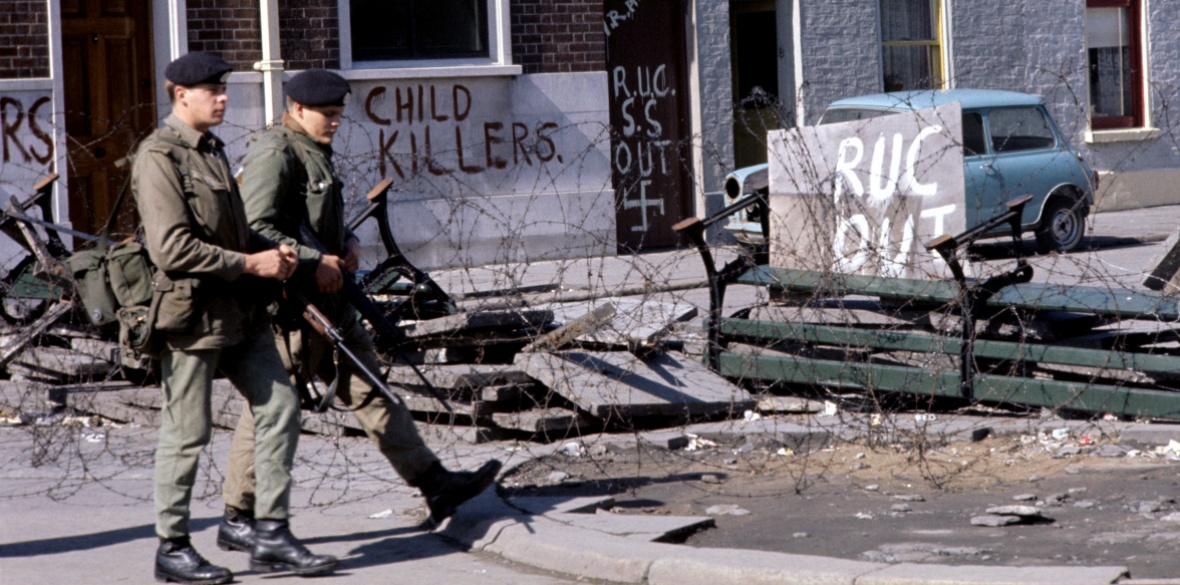This is the last article you can read this month
You can read more article this month
You can read more articles this month
Sorry your limit is up for this month
Reset on:
Please help support the Morning Star by subscribing here
AN MI5 report on policing compiled at the height of the Troubles will remain secret nearly half a century after it was written, Britain’s freedom of information watchdog has ruled.
The Information Commissioner’s Office (ICO) said police do not have to disclose the so-called Morton Report, which recommended a shake-up of the Royal Ulster Constabulary (RUC) Special Branch in 1973.
In reaching its verdict, however, the watchdog confirmed for the first time how significant the report could be for understanding the history of policing in the Troubles.
The ICO said the report was instigated by the head of MI5, Sir Michael Hanley, who suggested to then RUC Chief Constable Sir Graham Shillington that a senior Security Service officer conduct a review of Special Branch in June 1973.
The officer chosen was Jack Morton, a former colonial police chief in India.
A year after Morton wrote his report on Special Branch, loyalist paramilitaries killed 33 people and an unborn child in a series of car bombs across Dublin and Monaghan. It was the deadliest attack of the Troubles.
An inquiry by former Irish Supreme Court judge Henry Barron concluded: “A number of those suspected for the bombings were reliably said to have had relationships with British Intelligence and/or RUC Special Branch officers.”
Morton’s report on the Troubles is so sensitive that it took the ICO 18 months to reach a decision, in what became one of the watchdog’s top ten longest-running cases.
Over 20 academics from Britain and Ireland have called for the Morton Report to be made available for their research, but to no avail.
This month, the Commissioner ruled the report could stay secret because it was supplied by MI5.
“The Security Service confirmed that the report was directly supplied to the then Royal Ulster Constabulary (RUC), now known as the PSNI [Police Service of Northern Ireland], by MI5.”
WALKER REPORT
The ruling appears to contradict a move by the PSNI to release a similar report on RUC Special Branch that was compiled by a different MI5 officer later in the conflict.
Last July, the PSNI declassified almost all of a report produced in 1980 by MI5’s Sir Patrick Walker, after campaigners from the Committee on the Administration of Justice (CAJ) took the police to court.
Reacting to the latest decision, Daniel Holder, deputy director of CAJ, said: “It is difficult to conceive how the 1973 Morton report can’t be released by the PSNI for national security reasons when the PSNI did – eventually – release most of the 1980 Walker Report to CAJ in a similar case.
“Both relate to the structures of RUC Special Branch, and both were authored by MI5 officers.”
He warned that such reports can “reveal wrongdoing by the state.”
The Walker Report advised the RUC to prioritise keeping informants active in paramilitary groups instead of prosecuting them for crimes they had committed.
Sir Patrick said: “All proposals to effect arrests, other than those arising directly out of an incident, must be cleared with Special Branch to ensure that no agents, either RUC or army, are involved”.
Mr Holder said this showed the importance of declassifying such material, and stressed that the public has a right to know about the past.
“The application of blanket national security vetoes over historic information is not human rights compliant,” he warned, “particularly when the documents in question may contain evidence of past security policies and practices that involved or facilitated human rights violations.”
Mr Holder said the Morton report should be disclosed to prevent “a repetition of past practices that fuelled conflict.”
WHO WAS JACK MORTON?
John Percival Morton, CMG OBE, better known as Jack Morton, was born in India in 1911.
He joined the Indian Imperial Police Service in 1930 in the midst of anti-colonial unrest.
In his memoirs, he expressed racist views, saying: “Indians were a sort of immature, backward and needy people whom it was the natural British function to govern and administer.”
He commanded an armed paramilitary police unit before becoming a colonial Special Branch officer.
While raiding an Indian independence activist’s house in Amritsar, India, he found literature about Michael Collins and Sinn Fein.
“The Irish connection and the wider ramifications of the revolutionary movement made a deep impression on me at the time”, he said. “My interest in Special Branch matters now quickened.”
In 1944 Morton took charge of India’s Lahore District at the age of 33, the youngest officer to command its 4,000-strong police force, earning him an OBE.
As partition unfolded, Morton was offered a job with MI5 in Baghdad.
He rose through the ranks, serving as director of intelligence during the so-called Malayan Emergency and later became a senior figure in the Security Service.
In 1965 he was a Security Intelligence Adviser in the Colonial Office, where he was decorated with the “Most Distinguished Order of Saint Michael and Saint George.”
In 1973, he advised the RUC how to revamp its notorious Special Branch at the height of the Troubles.
In 1979 he made two advisory trips to Sri Lanka where he recommended their army receive SAS training to tackle Tamil separatists.
He died in 1985.

 Phil Miller
Phil Miller









